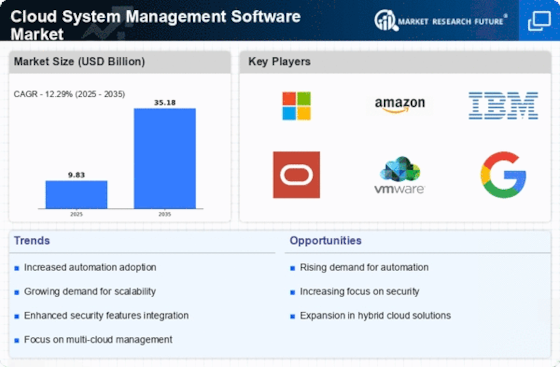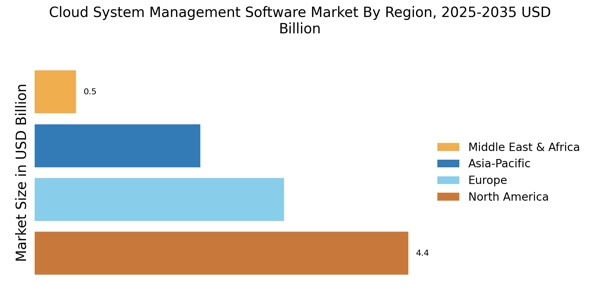Expansion of Remote Work Culture
The Cloud System Management Software Market is being influenced by the expansion of remote work culture. As organizations adapt to flexible work arrangements, the need for robust cloud management solutions becomes paramount. Cloud system management software enables seamless collaboration, data access, and project management from any location. This trend is supported by data indicating that remote work is expected to remain prevalent, with a significant percentage of the workforce continuing to work remotely in the coming years. Consequently, the demand for cloud management solutions that support remote operations is likely to grow, further driving the market.
Rising Demand for Cloud Solutions
The Cloud System Management Software Market is experiencing a notable surge in demand for cloud-based solutions. Organizations are increasingly migrating their operations to the cloud to enhance flexibility, scalability, and cost-effectiveness. According to recent data, the cloud computing market is projected to reach a valuation of over 800 billion by 2025, indicating a robust growth trajectory. This shift is driven by the need for businesses to adapt to changing market conditions and consumer expectations. As more enterprises recognize the advantages of cloud solutions, the demand for effective cloud system management software is likely to escalate, thereby propelling the market forward.
Increased Focus on Operational Efficiency
In the Cloud System Management Software Market, there is a growing emphasis on operational efficiency. Organizations are seeking ways to streamline their processes and reduce operational costs. Cloud system management software provides tools that facilitate automation, resource optimization, and real-time monitoring, which can lead to significant improvements in productivity. Recent studies suggest that companies utilizing cloud management solutions can achieve up to a 30% reduction in operational costs. This focus on efficiency is likely to drive the adoption of cloud management software, as businesses strive to enhance their competitive edge in an increasingly digital landscape.
Growing Importance of Compliance and Governance
In the Cloud System Management Software Market, the growing importance of compliance and governance is a critical driver. As regulatory requirements become more stringent, organizations must ensure that their cloud operations adhere to various compliance standards. Cloud system management software provides features that facilitate compliance monitoring, risk management, and governance frameworks. Recent reports indicate that companies face substantial penalties for non-compliance, which underscores the necessity of effective management solutions. As businesses prioritize compliance to mitigate risks, the demand for cloud management software that addresses these challenges is expected to rise, thereby influencing market dynamics.
Integration of Advanced Analytics and Reporting
The Cloud System Management Software Market is witnessing a trend towards the integration of advanced analytics and reporting capabilities. Organizations are increasingly relying on data-driven decision-making to enhance their operational strategies. Cloud management software that incorporates analytics tools allows businesses to gain insights into their performance, resource utilization, and cost management. This capability is essential for organizations aiming to optimize their cloud investments. Market data indicates that the analytics segment within cloud management solutions is expected to grow significantly, reflecting the increasing importance of data in driving business outcomes. This trend is likely to bolster the demand for cloud system management software.

















